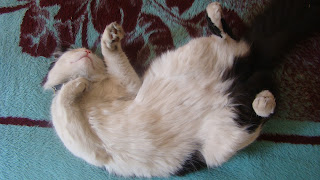I struggle with this "
Marketing" thing ALL the time.
I believe the biggest problem with this is due to my lack of computer and Internet knowledge. I am also a shy and timid person. Figuring it out on my own is painful at best and so I avoid it at all cost.
Through spending time online and starting rather awkward conversation that usually begin with "Hi, we don't know each other, but your profile looked interesting and I like the topics you discuss" and most fail to even get a reply, the rest either get a "do I know you?" or half-hearted "Hi" in return.
Occasionally, very occasionally do I meet people who are just plain
Awesome.
I suggest if you are one of these timid, shy people utterly terrified of your computer/blog/accounts full potential, then finding these awesome people is worth putting yourself out there!
For example, just by writing and posting a lot, even though I do a terrible and very basic job on the Internet as I don't know how to any better, I got approached by people who did know better!
First, a very nice person over Twitter asked to link a quote of mine onto their website here:
http://americanliterarymeritaward.com/Writing_Tips.html - "Don't allow the number of writers out there scare you..." Kelan Gerriety
Later, a lovely young man started his own "blog" which he uses to promote writers and he found me and offered me a spot in his blog, I even got to write my own "shameless plus" as he calls it. I call it an "enticing blurb" but it's the same thing really.
Mattxell Shameless Plug - Crimson Skies
I am also on a site called Wattpad -
KelanG on Wattpad
This has helped find an entire community of writers at various levels of progress.
What I like about this site over Twitter is that on Twitter I've found masses and masses of very serious writers all with series of published and self-published titles under their belts.
On Wattpad there is a wider mix (I've found this to be true at least, other opinions may vary) of writers at different levels :
- Your writing skill's own niche
- Writers below your skill level
- Writers above your skill level
I found it easier to find a group/niche where I fit in as writer, while being surrounded by people whom I am able to help (which every writer needs for both confidence and spotting similar problems within your own work found while reviewing other's work) and I am surrounded by people far more advanced than me who I could study and speak to freely. This all helps writers grow.
On this site, when I follow people's work and read/comment on their stories, they tend to notice very quickly and it's an easy way to connect with people.
I've found stories I fell in love with and I gladly spread the word to every online site I visit. I've found people who's personalities just shone and that made their writing glow and I, again, quickly spread word of their outstanding work.
I've made several "friends" there too, who do the same for me and in 2.5 months I've reached an audience of 4000+ readers.
I know nothing of marketing online or how to make a fancy website/blog or make the perfect tag to create flow through my sites.
What I do know how to do is to be honest, polite, helpful and involved.
This gets you noticed too. And for a better reason, I think. This doesn't show off my computer skills, but it does show off who I am as a person and with all the support I get, I've found the person I am does not suck!
So go and build relationships. (No, not online dating! Strictly Writing Relationships)
When people are opinionated or you strongly disagree with them, I've found it easier to leave the page/discussion and stay away from subjects that may just turn nasty, because really it's upsetting and a little pointless. They won't change their opinion and I'm very sure you won't either.
But when you read something you like, tell the reader why and which parts, even tell them which parts you found slow or disconnected because that helps a writer too!
When you find someone compatible, reach out to them, start a conversation. And when you find someone who made you smile or who was just really nice, go out of your way a little, maybe Tweet their link or mention it in a forum. It doesn't matter if they never find out, because I promise even if they don't return the favour, being that kind of person does not go unrewarded.
So write and talk and reach out, because it comes back to you. Especially if you're just no good at marketing, like me, this is something everyone can do.
Kel








